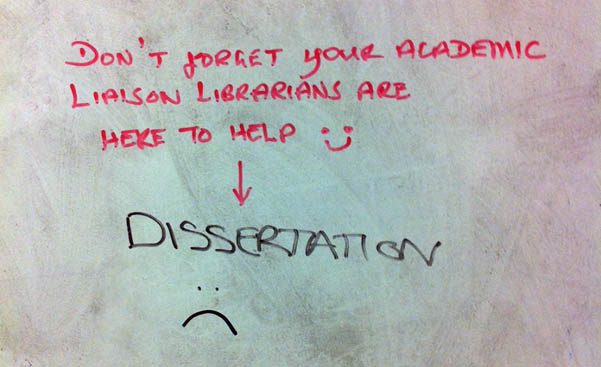Following on from Andy’s Speaking Wall post, Clare McCluskey has shared her experience of using a wall for feedback with users over the past few years in her library space at York St John University.
The feedback wall was introduced in 2011, as part of a wider project to increase dialogue between Information Learning Services (Library, IT, Media and Print) and the rest of the York St John University community. A re-design project gave the opportunity to rethink many of the established procedures. The library (as it was then) had regular questionnaires, feedback projects and user group meetings, but nothing to enable immediate dialogue.
We have one small wall of the library building covered in ‘whiteboard’ paint, but at the beginning of the project, we simply applied temporary whiteboard sheets to the surface. This meant we weren’t incurring a lot of expense, should the project be abandoned quickly. Pens are provided and anyone can leave feedback, questions or comments. These are then responded to by ILS staff, depending upon who is best placed to do so. This has become a core part of our strategy to engage with the rest of the community and improve our offerings for them.
Of course, not everything written on the wall is positive. Common issues include a perceived lack of resources in a subject area, which may indicate an actual gap that needs filling or that students are unable to navigate our systems to find what we do have:
|
Question/Comment |
Reply |
| More books on Buddhism in Thailand. Thailand religion & Sri Lanka. | Please ask your tutors to send orders through for these – we have money to buy them. |
| Could there be a Caribbean lit sub-section/post colonial lit sub-section. | Books in the library are shelved using the Dewey system, so that literature of the Caribbean, or other countries, or different topics, are shelved together. Always check the shelf number on Discover and watch out for interesting ebooks on the topic too! If you are having problems locating items, please ask at the service desk. |
| More copies of the ‘New Collins Japanese – English dictionary’. It’s the best one, but there’s only one copy. Also the second edition of ‘The Routledge comprehensive Japanese grammar’ would be nice | Yes, we will buy these texts ….thanks! |
Another issue which occurs frequently is the old problem of misunderstanding what Athens is and how subscriptions work. We use Athens as one authentication method, but the convoluted nature of logging in with local details often causes problems and we try to use EZProxy where possible. The misconception that Athens is the magic answer to accessing anything with a paywall persists, however, and the feedback wall gave us further evidence that we need to explain subscriptions, open access and the whole issue of access to research much more:
| Question/Comment | Reply |
| Could we have access to OpenAthens. Seems like they hog all the best articles. | Athens is used here. Please come to the service desk and ask to speak to an Academic Liaison Librarian who will be able to help you with this. |
| Why isn’t there access to ALL (mentions very large journal publisher) Journals online? | Please ask to talk to your Academic Liaison Librarian, who can explain more about journal subscriptions. |
An unexpected bonus is that the students now communicate with and reply to each other on the wall, often beating us to it in the speed of reply! In terms of managing expectations, it is good for us to know that they are engaging with each other and letting others know that not everyone agrees with their point of view.
I don’t think there will be enough computers for all students in YSJ. But can you be considerate? If you are using your laptop instead of the computer in front of you, can you PLEASE move to empty tables instead?
Hard copies instead of electronic books. They are annoying to read! …Agree! …sometimes you can find copies, just change your search criteria! … Agreed, or try Google books …….This is the exact opposite of what I want ..… What if you can’t get to the library? E-books are easier to find your quote as well.
We keep a record of everything so that we can spot trends. This has already resulted in a move-around of the book stock in the building and we are about to implement a wider laptop loan scheme, with self-issue. Excellent work in noting all of the comments by our administrative staff in a single spreadsheet also means that we have a growing data bank to draw on. We plan to use the NVivo package to analyse it as part of a large project on ensuring we understand the needs and concerns of the community.
 Clare McCluskey
Clare McCluskey
Academic Liaison Librarian
Information Learning Services
York St John University
@librarygirl79



